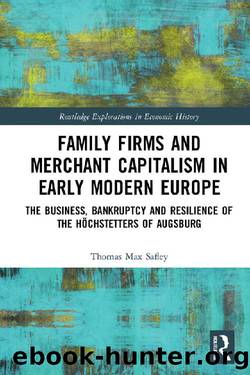Family Firms and Merchant Capitalism in Early Modern Europe (Routledge Explorations in Economic History) by Thomas Max Safley

Author:Thomas Max Safley [Safley, Thomas Max]
Language: eng
Format: epub
ISBN: 9780367137106
Publisher: Taylor and Francis
Published: 2019-11-20T23:00:00+00:00
4 Bankruptcy
Local institutions and their consequences
On 26 September 1531, Ambrosius I Höchstetter stood accused and at bay before the City Court of Augsburg. The crisis he had sought to avoid with the assistance of Anton Fugger in 1528 had swept his family firm away. The rumors of insolvency had proven unmanageable; a run on the bank had ensued. On 1 July 1529, he had petitioned the City for bankruptcy protection. When the private negotiation and official mediation that are the topics of this and the following chapter failed to resolve the dispute, to say nothing of the secret machinations that preceded and accompanied them, he and two of his partners, son Ambrosius II and nephew Joseph, suffered arrest and confinement. Efforts to locate and sequester his property proved difficult, despite his promise of full disclosure and cooperation. Now, his creditors and the authorities wanted what had thus far eluded them: Clear answers.
Above all, the authorities and creditors wanted to know what Ambrosius knew and when he knew it.
[A]s he, the old Höchstetter, had seen and known his ruin two years ago [1529, tms], as he himself admitted before the authorities, [why] had he fraudulently run up such huge debts in 1527 and 1528 and raised a sum to the ruin of rich and poor alike, fully aware that he knew he would not be able repay?1
He responded that he had had no knowledge of any insolvency in 1527; on the contrary, his âestimateâ (Ãberschlag) of that year had shown assets in excess of 100,000 fl. They wanted to know why he had asked his creditors for an 18-month period of grace to continue in business, which he maintained would enable him to repay his debts with interest and remain an honorable, propertied man, when he had been aware that he had no possible means of doing either. He answered that he had had no idea his spokespersons had made any such offer, no knowledge that his affairs had been so badly compromised and no reports from the Netherlands or similar locations. They accused him of fraud, borrowing money that he could not repay with the intention of absconding with it, misrepresenting the state of his finances to the disadvantage of his creditors.
The interrogation â the first of several â extended to 26 articles and must have lasted hours. Most of their questions and answers circled around the current value and location of his capital, all of which was now subject to seizure and redistribution. âFourthly, ask and insist strongly, what is openly rumored, whether [men of] the counts of Ortenburg took substantial property, which belonged to the Höchstetters, from the house of Philip I Gassner and transported it via backways out of the city, where, how, when and such like it has goneâ.2 Ambrosius responded, â[he] knows nothing about this, insists sincerely, if he had so much as three pennies, he would give two to his creditors and keep only one for his sustenance; should one find it to be otherwise, they should punish him corporally (an Leib und Leben), as the law requiresâ.
Download
This site does not store any files on its server. We only index and link to content provided by other sites. Please contact the content providers to delete copyright contents if any and email us, we'll remove relevant links or contents immediately.
The Fifteen Biggest Lies about the Economy: And Everything Else the Right Doesn't Want You to Know about Taxes, Jobs, and Corporate America by Joshua Holland(1115)
The Economist (20210109) by calibre(933)
The World For Sale by Javier Blas(861)
Made in China by Anna Qu(850)
Philippines--Culture Smart! by Culture Smart!(712)
Mission Economy by Mariana Mazzucato(690)
Boom and bust a global history of financial bubbles by Quinn William Turner John(688)
Forex Trading All In One For Dummies by Mishra Mamta(663)
Big Money by Kenneth P. Vogel(649)
The Dictatorship of Woke Capital by Stephen R. Soukup(648)
The Money Revolution by Anne Boden(646)
The New Retirement Savings Time Bomb by Ed Slott(634)
Green Public Procurement under WTO Law by Rika Koch(632)
Tax the Rich! by Morris Pearl(630)
Cross Winds: Adventure and Entrepreneurship in the Russian Far East by Myers Steven(624)
The Inflation Myth and the Wonderful World of Deflation by Mark Mobius(618)
Fundamentals of Finance by Mustafa Akan Arman Teksin Tevfik(589)
The Great Demographic Reversal by Charles Goodhart & Manoj Pradhan(580)
European Yearbook of International Economic Law 2017 by Marc Bungenberg Markus Krajewski Christian Tams Jörg Philipp Terhechte & Andreas R. Ziegler(580)
